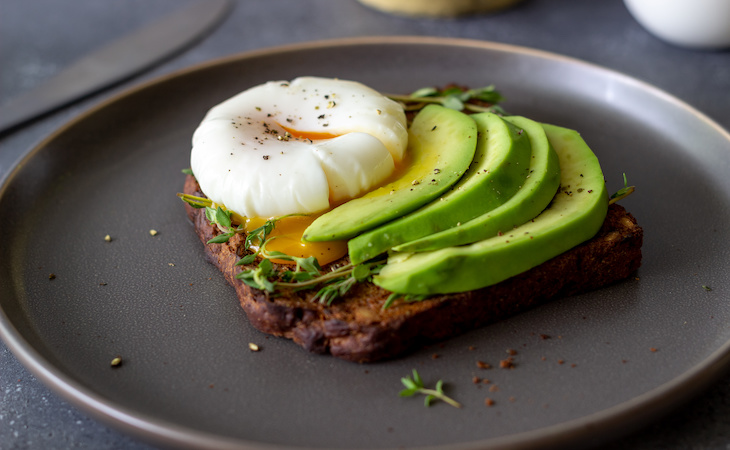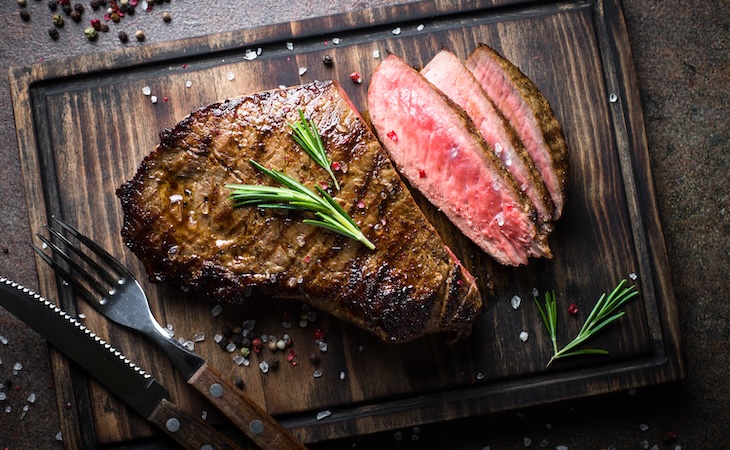Chances are you’ve heard about the one-meal-a-day madness or the 16:8 craze. Maybe you’ve even tried one of these trendy diets yourself. Intermittent fasting (IF) has snuck up on the dieting collective conscious in the last three years, and it continues to dominate wellness conversations because of its proven efficacy for weight loss and hunger control. There are plenty of anecdotes about IF improving sleep too.
But there’s one type of intermittent fasting, known as time-restricted eating (TRE), that deserves its very own space in the menagerie of fasting methods—and your attention, especially if you’re looking for ways to hack your diet for better sleep.
What is time-restricted eating?
The term time-restricted eating is often used interchangeably with intermittent fasting, but it’s not exactly the same thing.
On her popular wellness blog Found My Fitness, Rhonda Patrick, PhD, biomedical science expert on nutrition, says that one major difference between IF and TRE is that time-restricted eating, unlike intermittent fasting, doesn’t involve any calorie restriction.
“Time-restricted eating permits a person to eat as much as they want during the eating window,” she explains. “It also aligns the eating and fasting cycles to the body’s innate 24-hour circadian system.”
Whereas intermittent fasting simply restricts your eating window irrespective of time (for example, 10 a.m. to 6 p.m. or 2 p.m. to 10 p.m.), time-restricted eating focuses on limiting your eating window to daytime eating: as early as possible and rarely ever at night.
This circadian component of time-restricted eating is what separates it from every other form of fasting-type diets. But what makes the circadian aspect so important to your health—and your sleep?
Time-restricted eating and your circadian clock
Most people understand that the circadian rhythm controls when you sleep and wake and that any disruption to it, like caffeine at night or blue light, can cause sleep problems. But what you might not know is that the circadian cycle governs every bodily function—including metabolism, mental alertness, and even digestion.
According to Satchin Panda, PhD, author of The Circadian Code, the circadian clock is a network of regulatory genes controlled by a master clock, the suprachiasmatic nucleus (SCN). “Every organ, every tissue, and almost every cell has its own circadian clock,” explains Panda in an article for MyCircadianClock.com. These clocks typically operate in 12-hour on/off cycles.
The SCN “master clock” in your brain is reset by morning light, Panda says, which sets off a cascade of signals to genes that regulate liver function, stomach acid and enzyme production, and thousands of other actions.
But sunlight isn’t the only thing that affects your gene expression. Your behavior, such as when you eat, exerts an influence on circadian genes as well.
Your 12-hour circadian wake cycle turns on with midnight light exposure. That wake cycle means everything is awake—including every part of you that craves, eats, and digests food. And for 12 hours, you’re perfectly equipped to gormandize as much as you want.
But after 12 hours—once the light starts fading and your body temperature starts dropping—your 12-hour circadian sleep cycle kicks in. That means your stomach and digestive faculties slow down in preparation for the restorative process of sleep.
The thing is, when you start eating outside of your 12-hour wakeful window, your stomach and liver genes turn back on—but with diminished efficiency, since it’s outside of your optimal circadian rhythm. This triggers other wakeful genes to turn on, including those that affect your brain’s alertness. Ergo, you don’t sleep as well as you should.
That’s why time-restricted eating focuses on eating early and fasting later. And the science backs up this approach.
One study, published in the journal Cell Metabolism, shows that following a 10-hour time-restricted eating plan improves sleep, reduces weight, decreases blood pressure and cholesterol, and stabilizes blood sugar and insulin levels for an overall decreased risk of heart disease and diabetes.
“Eating and drinking everything (except water) within a consistent 10-hour window allows your body to rest and restore for 14 hours at night,” Emily Manoogian, PhD, co-author of the study tells ScienceDirect. “Your body can also anticipate when you will eat so it can prepare to optimize metabolism.”
Another study, published in the journal Nutrients, also finds that time-restricted eating improves glucose and insulin levels—and it even positively affects hormones and genes and hormones related to longevity. According to the study authors, this research demonstrates that TRE may have anti-aging effects.
Related: Here’s what the keto diet does to your sleep
How to make time-restricted eating work for you
As many of you late-night masticators know, not eating after 6 or 7 p.m. can feel like an impossibility. Eating is a way we connect with others, and it’s also a bona fide stress reducer—in the short term at least.
So how can you stick to a time-restricted eating habit without feeling cranky and deprived?
Get bright light exposure
Remember that part about sunlight resetting that suprachiasmatic thingamajig, your body’s master clock? Well, if you want better sleep via TRE, then you’ll need to adopt the circadian principle of rising and setting with the sun.
But it’s not just getting up early—you have to intentionally get more bright light exposure.
“While a few minutes of bright light may be enough to nudge our clock and synchronize our internal clocks with the morning light,” writes Panda on his blog, “we need an hour of bright light to suppress melatonin (and sleep).”
This prolonged exposure strengthens your circadian rhythm and makes it easier to be hungry when you’re supposed to and to fast when you’re supposed to. (If you’re locked in an office all day, consider a bright-light lamp, such as one from Circadian Optics, to increase your total exposure.)
Practice meditation
Cortisol, also known as the stress hormone, makes you hungry by increasing your levels of ghrelin, the hunger hormone. Most people have no problem relieving some of that stress by munching on a nighttime snack. But if you’re eager to improve your circadian rhythm and sleep through time-restricted eating, you’ve simply got to find another way to deal with stress in the evening.
Breathwork is probably the easiest method. Studies show that simple breathing techniques done for minutes each night significantly reduce cortisol output, and therefore the feelings of stress. (FWIW, Panda says that TRE holds its benefits even with two days of cheating a week—like Friday night drinks and food with friends.)
Drink up
Your body burns fat for fuel while you snooze, which requires significant amounts of water. So, later at night, your body typically sends out a thirst signal. That said, it’s easy to confuse this thirst signal as a snack signal. But instead of reaching for something sweet or carby, guzzle H20 instead. Just not too much, though: After all, you don’t want to disrupt your sleep by waking up to pee.
Certain foods can make it easier to catch Z’s. Here are the right foods to eat for better sleep.




